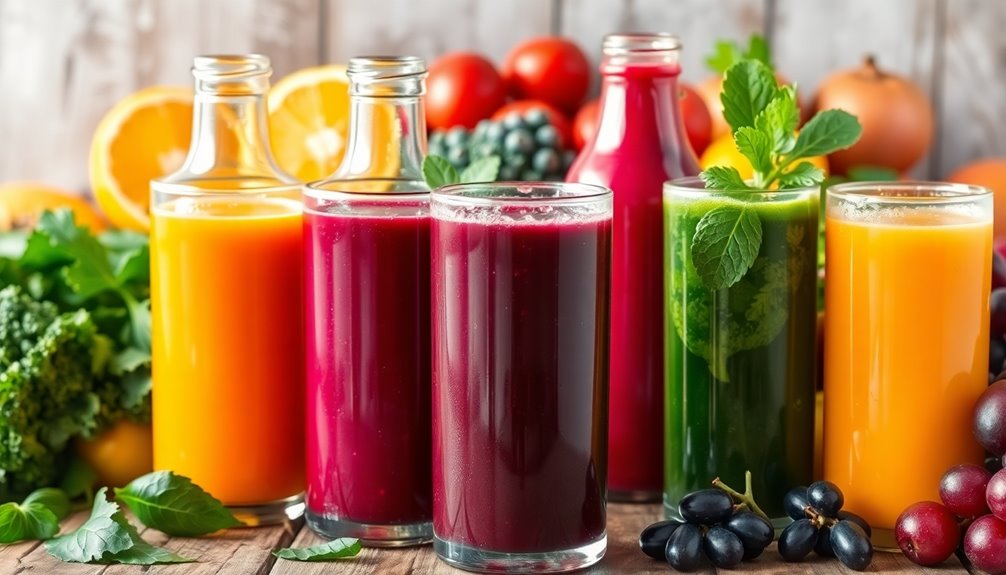Juices offer varied nutritional profiles, each with unique benefits. For instance, orange juice packs vitamin C and natural sugars, while tomato juice is low in calories and rich in lycopene, promoting heart health. Pomegranate juice stands out for its high antioxidant content. Grapefruit juice aids in weight management, and prune juice supports digestion with fiber. However, moderation is key, as high sugar can spike blood sugar levels. There’s much more to discover about juice nutrition! When considering the nutrition values of different juices, it’s essential to understand how they can fit into a balanced diet. Many juices also provide hydration and essential vitamins, making them a refreshing addition to meals or snacks. Incorporating a variety of juices can ensure a broader spectrum of nutrients, supporting overall well-being while still keeping an eye on sugar content.
Key Takeaways
- Orange Juice: 110 calories and 25.5g carbohydrates per 8 oz; high in vitamin C but low in fiber and high in natural sugars.
- Tomato Juice: Low in calories, providing 189% of daily vitamin C; rich in lycopene, supporting heart health and cancer risk reduction.
- Pomegranate Juice: High in antioxidants and vitamin K; combats free radicals and supports kidney health, with antioxidant activity exceeding that of red wine.
- Grapefruit Juice: Approximately 94 calories per 8 oz, nutrient-rich; aids weight management but may interact with medications.
- Prune Juice: Contains 3-4g of dietary fiber per cup; promotes digestion and regular bowel movements due to sorbitol's natural laxative effects.
Nutritional Profile of Orange Juice

When you pour yourself a glass of orange juice, you're not just enjoying a refreshing drink; you're also consuming a rich source of essential nutrients.
An 8-ounce serving packs about 110 calories and 25.5 grams of carbohydrates, along with 2 grams of protein. While it offers minimal fiber, orange juice is high in natural sugars. Additionally, processing and storage can decrease antioxidant activity significantly in orange juice.
You'll get 100% of your daily vitamin C and about 14% of your potassium needs in that same serving. Plus, it's a decent source of folate and vitamins like thiamine and B6.
If you choose fresh-squeezed or 100% orange juice, you'll likely get more nutrients than from processed varieties.
Just remember to enjoy it in moderation due to its high sugar content.
Health Benefits of Tomato Juice

Orange juice offers a refreshing burst of nutrients, but tomato juice brings its own impressive health benefits to the table. Packed with lycopene, tomato juice lowers your risk of certain cancers, especially prostate cancer, while also supporting heart health by reducing LDL cholesterol. It aids your digestion, promoting a healthy liver and regular bowel movements. With a whopping 189% of your daily Vitamin C needs per cup, it boosts your immune system and enhances iron absorption. Additionally, its antioxidant properties help reduce inflammation in the body. Plus, its high fiber content helps with weight management. Tomato juice even offers benefits for your skin, potentially reducing acne and protecting skin cells from damage. Incorporating it into your diet can lead to a healthier, more vibrant you.
Antioxidant Power of Pomegranate Juice
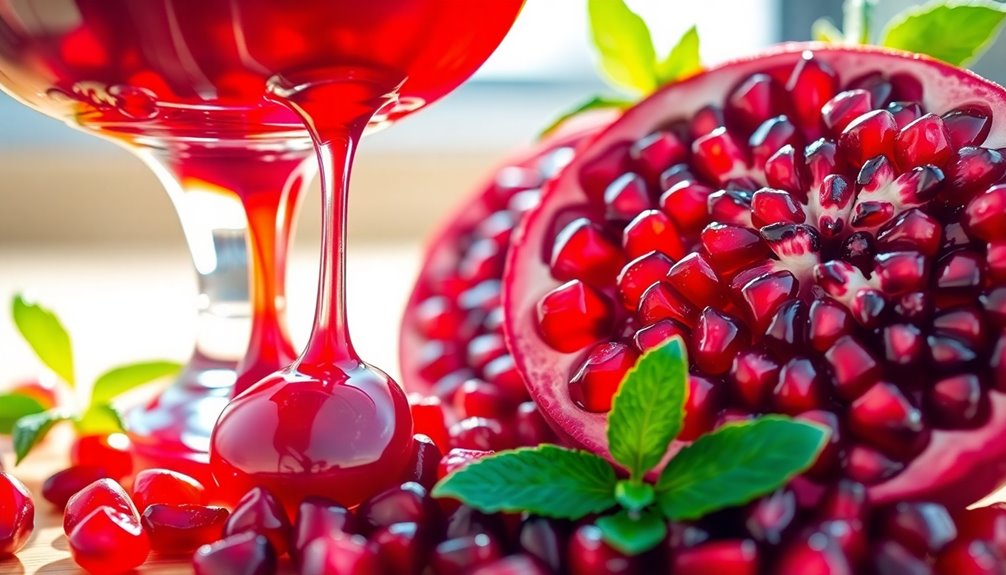
Pomegranate juice stands out for its remarkable antioxidant power, thanks to its rich composition of beneficial compounds.
It's packed with polyphenols, including punicalagin, which enhance its high antioxidant activity. You'll also find anthocyanins and ellagic acid derivatives, both known for their strong antioxidant effects. Additionally, the juice is an excellent source of nutrients for kidney health, supporting overall function and well-being.
In fact, pomegranate juice boasts an antioxidant activity three times higher than red wine and green tea. This juice helps combat free radicals, reducing oxidative stress and potentially lowering your risk of cancer and heart disease. Additionally, its anti-inflammatory properties can aid in diabetes management and support overall immune function. Regular intake may lower inflammatory markers in diabetic subjects, further contributing to your health.
With every sip, you're not just enjoying a delicious drink; you're fueling your body with powerful nutrients that promote lasting health.
Grapefruit Juice: A Tangy Choice

Grapefruit juice offers a refreshing and tangy option for those looking to boost their nutritional intake. With about 94 calories per 8 oz serving, it's low in calories yet packed with essential nutrients. You'll get a hefty dose of vitamin C, providing around 59% of your daily value, which helps support your immune system. Plus, it contains beneficial minerals like potassium, magnesium, and calcium. This juice can aid in weight management due to its low calorie and high water content. Additionally, grapefruit juice is an excellent source of vitamins A and C, which are vital for overall health. Incorporating unique homemade fruit juice recipes can further enhance your nutritional benefits. However, keep in mind its acidity, which may affect those with sensitive stomachs, and its potential interactions with certain medications.
Digestive Health With Prune Juice

When it comes to promoting digestive health, prune juice stands out as a natural aid that many people can benefit from.
With about 3-4 grams of dietary fiber per cup, it helps maintain regular bowel movements and alleviates constipation. The sorbitol in prune juice acts as a natural laxative, attracting water into your colon and softening stool. Additionally, prune juice contains 0.32 grams of fiber, which supports digestive function and regularity. Natural remedies can also enhance digestive health and work well alongside prune juice consumption.
Plus, its antioxidants and fiber support a balanced gut microbiome, enhancing overall gut health. Prune juice also stimulates the release of digestive enzymes, improving nutrient absorption.
To reap these benefits, consider drinking 4-8 ounces daily, and enjoy the versatility of prune juice in recipes. It's a delicious way to support your digestive system while enjoying a tasty treat!
Vitamin C in Cranberry Juice
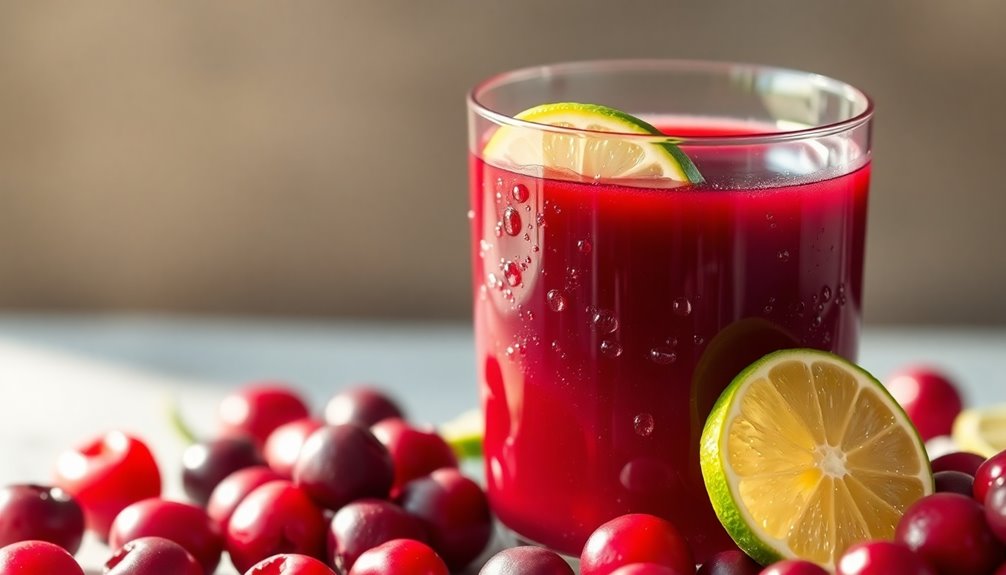
Cranberry juice packs a punch with about 23.5 mg of vitamin C per cup, making it a fantastic source of this essential nutrient. This serving provides 23-26% of your recommended daily intake, supporting a healthy immune system and acting as a powerful antioxidant. Additionally, the vitamin C content can vary by brand and processing method—sourcing and processing methods can impact the optimal amount of vitamin C in cranberry juice, with pasteurization capable of reducing it by up to 90%. Opt for cold-pressed or unsweetened varieties to maximize your vitamin C intake.
Besides boosting immunity, the antioxidants in cranberry juice also promote heart health and collagen production, further enhancing your overall well-being.
Apple Juice: Sweetness and Nutrition

While cranberry juice shines for its vitamin C content, apple juice offers a different kind of sweetness along with its own nutritional benefits.
With about 110 calories and 25-30 grams of sugar per 8 oz serving, it's a naturally sweet treat. You'll also find around 28 grams of carbohydrates, but no protein or fat. Additionally, apple juice contains 80% DV Vitamin C, making it a beneficial option for your daily nutrient intake. Juices may lack fiber, which is important for digestion, but apple juice still supports your overall health.
Apple juice is a good source of potassium, providing 277-590 mg per serving. If you choose fortified varieties, you might get up to 100% of your daily vitamin C.
The antioxidants in apple juice can support your immune system and heart health. Plus, its hydrating properties make it a delightful choice for refreshing yourself throughout the day.
Comparison of Juice Types
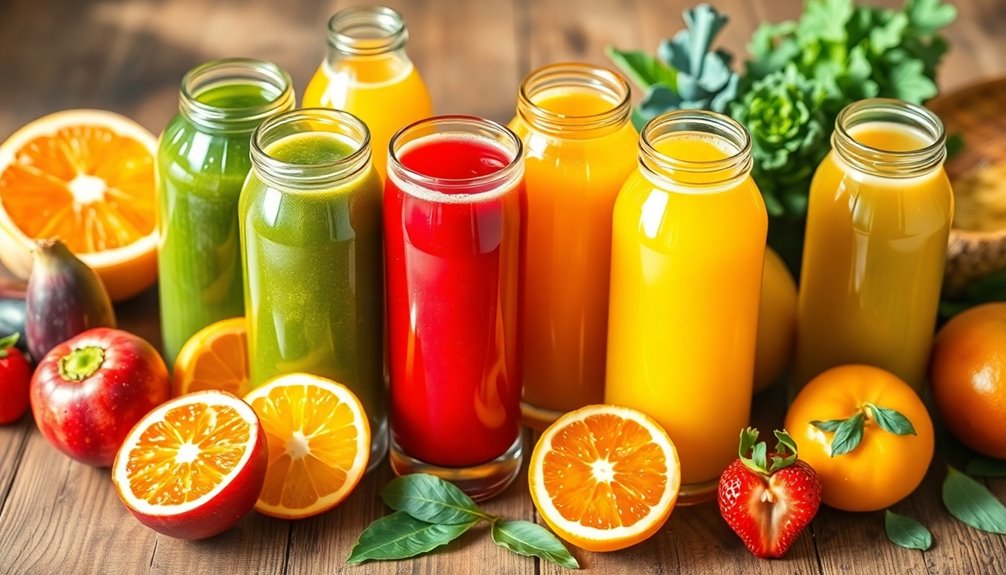
Orange juice is a popular choice, packed with vitamin C and folate, though processing can diminish its benefits. Additionally, not from concentrate juices typically retain more nutrients during production. Aromatherapy can enhance mood and alleviate anxiety symptoms, making a glass of fresh juice a refreshing way to boost emotional well-being.
Grape juice offers a sweet taste with about 60 calories per 100 ml, but watch out for its high sugar content.
Cranberry juice is known for its UTI prevention benefits, yet it also has a significant sugar content. The antioxidants in cranberry juice can support emotional well-being, adding to its health benefits.
Pomegranate juice is rich in antioxidants and vitamin K, but it too contains lots of sugar.
On the lighter side, tomato juice is low in calories and high in vitamin C, while carrot juice stands out as a low-calorie option with less sugar. Each juice has its unique profile, so choose wisely!
Recommendations for Juice Consumption
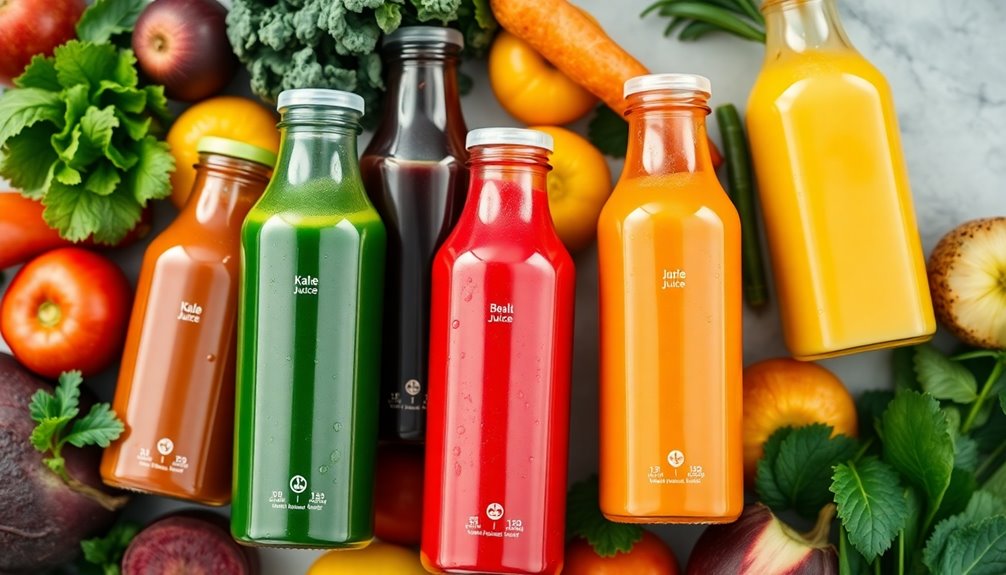
When considering juice consumption, it's essential to prioritize moderation and choose wisely to support overall health.
For children under 1 year, avoid giving fruit juice unless advised by a doctor. If you have toddlers aged 1-3, limit their juice intake to 4 ounces daily. For kids aged 4-6, aim for 4-6 ounces per day, while remembering that fresh fruits are a better option due to their fiber content. Juice does not provide the same benefits as whole fruit due to lack of fiber. Additionally, it is important to note that excessive consumption of juice can lead to digestive issues due to acidity.
Always serve juice in a cup, not in bottles or sippy cups, to prevent tooth decay. Incorporating a variety of juices can provide unique nutrients, but be cautious of sugar levels.
Opt for homemade juices to control ingredients, and always read labels to choose low-sugar options.
Potential Drawbacks of Juice Intake

Although juice can seem like a healthy choice, it often comes with several potential drawbacks that you should consider.
First, juicing strips away most of the fiber from fruits and veggies, which can lead to digestive issues and reduced satiety. You'll also miss out on essential proteins and healthy fats, crucial for energy and muscle maintenance. Juice cleanses often lead to low calorie intake, which can cause low blood sugar symptoms. Additionally, relying on juice for hydration can lead to a lack of nutrient diversity in your diet over time.
Many juices are high in natural sugars, potentially causing blood sugar spikes and increasing calorie intake. This may lead to overconsumption, as juices don't fill you up like whole fruits do.
Long-term reliance on juices can result in nutrient deficiencies and increase the risk of chronic diseases.
Plus, unpasteurized juices may expose you to harmful bacteria, especially if your immune system is compromised.
Frequently Asked Questions
Can Juice Replace Whole Fruits in My Diet?
Juice can't fully replace whole fruits in your diet.
While it's convenient and tasty, it lacks the fiber and essential nutrients that whole fruits provide. Juice may spike your blood sugar and leave you feeling hungry sooner.
Incorporating whole fruits supports digestion, satiety, and overall health. Instead of relying solely on juice, enjoy it occasionally while prioritizing whole fruits for a balanced, nutrient-rich diet.
Your body will thank you!
How Much Juice Can Children Safely Consume Daily?
As the saying goes, "Everything in moderation."
For children, juice consumption should be limited based on age. Kids aged 1-3 can safely have up to 4 ounces, while those 4-6 should stick to 6 ounces.
If your child is between 7-18, aim for no more than 8 ounces daily.
Are There Any Juices Low in Calories?
Yes, there are several low-calorie juices you can enjoy.
For instance, cucumber juice has just about 10 calories per 100ml, while watermelon juice is light and hydrating.
Tomato juice and grapefruit juice are also great options, providing around 41 and 53 calories, respectively.
If you're looking for something fruity, peach juice has around 42 calories.
Just remember to watch the sugar content, even in low-calorie choices!
What Are the Best Juices for Hydration?
When you're looking for the best juices for hydration, melon juices like watermelon, cantaloupe, and honeydew are top choices due to their high water content and electrolytes.
Vegetable juices like cucumber and celery also pack a hydrating punch.
Don't overlook fruit juices like orange and berry juices, which offer vitamins alongside hydration.
Coconut water and lemon water are great alternatives too, providing both flavor and essential nutrients for optimal hydration.
Can I Mix Different Juices for Added Benefits?
Why settle for a single flavor when you can create a symphony of tastes? Yes, you can absolutely mix different juices for added benefits!
By combining juices, you enhance vitamin intake, boost antioxidants, and support hydration. Just remember to balance flavors and nutrients to keep your concoction healthy.
Adding in some leafy greens or protein can elevate your drink even further, making it not just tasty but nutritious too! Enjoy experimenting!
Conclusion
In the grand tapestry of health, juices play a vibrant role, each with its unique flavor and benefits. While sipping on a glass of fresh orange juice may evoke memories of carefree summer mornings, remember to balance your choices. Embrace the antioxidant richness of pomegranate and the tangy zest of grapefruit, but also be wary of excess sugar. By making mindful decisions, you can savor the sweet moments of life while fueling your body with nature's goodness.
Cindy thoroughly researches juicing trends, techniques, and recipes to provide readers with practical advice and inspiration. Her writing style is accessible, engaging, and designed to make complex concepts easy to understand. Cindy’s dedication to promoting the advantages of juicing shines through her work, empowering readers to make positive changes in their lives through the simple act of juicing.

